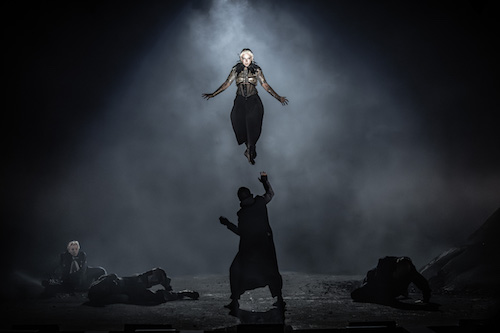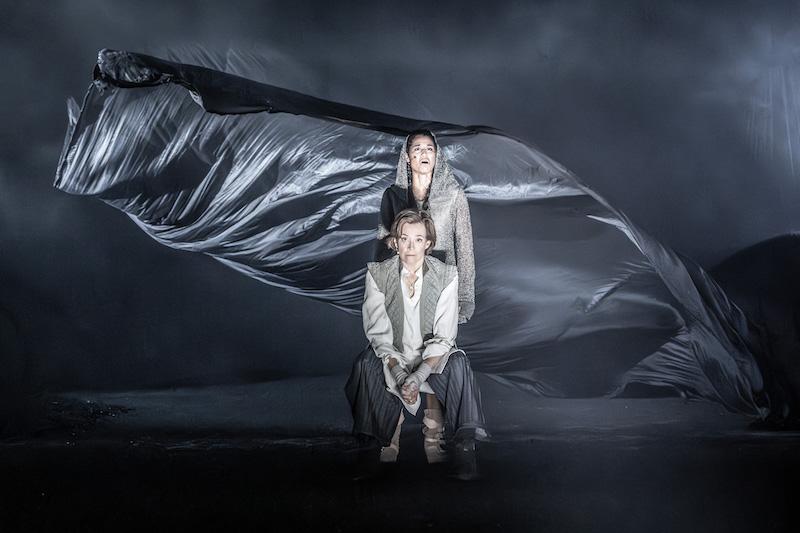Shakespeare must have relished the opportunities brought by the indoor Blackfriars Theatre in 1611: sound magnified in a way impossible outdoors, magical stage effects in the semi-darkness, possibly even fireworks - and all at a time when the masque was the most fashionable theatre form. The Tempest, written especially for the venue, includes a masque and has masque-like properties throughout. Modern directors sometimes provide an equivalent, using whatever technology is at their disposal now, as Greg Doran did in 2016, introducing a digital avatar Ariel while also giving the betrothal masque full operatic weight. Julie Taymor, taking advantage of cinematic tricks, required Helen Mirren's Prospera to conjure a spectacular light show instead of a masque. Here there is no masque at all.
Jamie Lloyd is an innovative director, at home with technology, able to reveal the essentials of classics (as in Cyrano de Bergerac) or to bring an original spin to the familiar (as in The Seagull, Richard III or Macbeth, for instance). So perhaps it should not be surprising that the island at Drury Lane is almost entirely imaginary, an unreal, stylised place, depending on Shakespeare's words, sound and lighting to create atmosphere. There are no spectacular technical tricks (beyond Ariel's flying) and the simplest possible means shows the heavens in a roar: billowing silks encompassing the stage.
Lloyd and his designer Soutra Gilmour have conjured a strange, otherworldly, hilly, inhospitable place filled with arresting sound and lighting effects. The composers Ben and Max Ringham with Michael 'Mikey J' Asante, and lighting designer Jon Clark, fill the monochrome space with loud sound, thunder claps (all the cast wear head mics) and sometimes dazzling lights. There's not much evidence of the "sweet airs" Caliban speaks of or indeed of any plant or animal life. This is not a comfortable world. When this Prospero's revels end, there being no stage masque to dismiss, she may mean something more apocalyptic, which perhaps applies to the audience too.
Sigourney Weaver's Prospero (Duchess of Milan) has no visible book, magic cloak or staff to give her power or for her to abjure. When she prepares to leave the island she puts on her Milanese costume ready, it seems, to face reality. If it were not for the return of Prospero to her rightful place in Milan and the impending marriage of Ferdinand and Miranda, the miscreants - Prospero's usurping brother Antonio and his co-villains Alonso and Sebastian - might imagine they had experienced a dream.

Weaver's Prospero is sad and solemn rather than angry, often seated, still - even static - watching impassively as her plans unfold: Miranda, her daughter, and Ferdinand, son of Alonso, King of Naples, fall in love at first sight and her enemies are punished. She often seems a half-involved stage manager of events. Emotion at last crosses her face when Ariel tells her that they would pity the plight of the beaten conspirators if they were human. For a moment Prospero finds her humanity and is moved to forgive. A woman playing the role is, of course, nothing new: Vanessa Redgrave and Harriet Walter are ones I have seen, as well as Mirren, and there have been others, including Alex Kingston at Stratford last year. A change of gender is simply a regular variant. Here Gonzalo (Selina Cadell), Prospero's saviour when her brother intended her to die at sea, is also feminised. Cadell adds a welcome sense of wonder to the courtier's gentleness.
As Ariel, Mason Alexander Park (recently Emcee in Cabaret) is the central energetic force throughout, swooping from the rafters in gilded breastplate and black feather ruff, singing in a voice which is both earthy and ethereal. This is a creature from another, mysterious, dimension who, nevertheless, has a complicated relationship with Prospero, anxious for liberty but taking pleasure in service.
The text, which goes at a lick, is pared down to such an extent that there is little time for magic. No betrothal celebration led by goddesses then, but no mirage-like feast to confuse the noble conspirators either or visible trumpery clothes to tempt the low-born plotters and no glimpse of the young people playing chess, revealing their attitudes to each other and to regal responsibility. Ariel has no harpy costume and there is not even a "gaberdine" under which Trinculo (Matthew Horne) can take shelter with Forbes Masson's bulky and decidedly human Caliban. The comedy survives well enough, however, in the hands of these two (even after Horne left the stage briefly with a bleeding forehead on an early press night) joined by a drunkenly swaggering Stephano, played with gusto by Jason Barnett. Unusually, they do have a prop: a hip flask.
This production may well be loved by some but hated by others ("Miserable isn't it" a passing woman volunteered to me in the interval). It would certainly surprise John Gielgud who was the last to play Prospero here, in 1957, but it's good to see Shakespeare back in this venerable building after more than 60 years. For my part, I would have preferred a more actively engaged Prospero - and even, dare I say, a masque.
Next here is Jamie Lloyd's production of Much Ado About Nothing starring Tom Hiddleston and Hayley Atwell.















Add comment